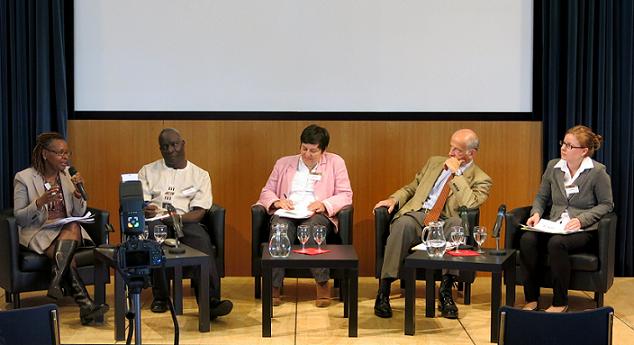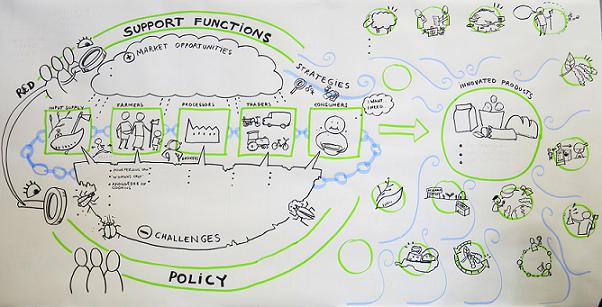-
About
- Our Work
- Get Involved
- Stay Updated
Where does our world food system change towards?
 The United Nations declared 2014 to be the International Year of Family Farming. In this context the first AGRINATURA Science Days brought together scientists, international scholars, private sector and youth in Vienna between May 5–8 for an exciting event titled: “Growing together - Family Farming and agricultural sciences transforming world food systems”.
The United Nations declared 2014 to be the International Year of Family Farming. In this context the first AGRINATURA Science Days brought together scientists, international scholars, private sector and youth in Vienna between May 5–8 for an exciting event titled: “Growing together - Family Farming and agricultural sciences transforming world food systems”.The objective of AGRINATURA Science Days was to unite researchers and practitioners concerned with family farming, food security and transformative change, in one single forum consisting of keynote speeches, presentations and workshops, as well as of open space discussions in both large and small groups.
The plenary session opened up with a lively discussion on smallholder farmers access to markets. It became clear that the main challenge in this domain consists of the fact that a majority of interventions are focused on farmers who already have access to the market. The question therefore became how to include and reach those farmers who as of yet have no access to the market. The keynote speakers tackled this question by listing and emphasizing aspects that are able to mitigate this problem and help to solve this challenge. One speaker demonstrated for example how working closer with the farmers associations and decision makers may bring in an innovative partnership across the value chain.
The following day the attendants to the conference were given the opportunity to participate actively and learn from the keynote and dialogue session with regards to the topic “Small-scale family farming and food poverty: Achievements and the unfinished agenda”. Some of the main points made during the discussion included the importance of leadership, knowledge management, skills development and the role of women and young professionals in agriculture. YPARD representative for Switzerland, Rahel Wyss, stressed the importance of young people who, whilst being very innovative, simultaneously require appropriate support and mentorship.

A session which was a personal favourite of mine was called Stories from the field. In this session, participants were split up into small working groups concentrating on success stories from farms and ARD projects. The story which was presented in my group focused on how to transition from the needs of farmers towards the lab and then back to the farmers. The project dealt with research and development of biofertilizers. The message I took home from this exciting session was that the timeframe necessary to bring a product -which was performing perfectly in the lab-to the market, was twice as long as what the researchers had initially planned.
During these AGRINATURA Science Days many questions concerning education in agriculture, innovations and partnerships were raised. There was a general consensus amongst the participants that strengthening the knowledge triangle between Academia, Industry and Government should be a top priority. We received information about food insecurity and current projects aiming to cope with it. We recognized that the research system should be constructed to serve farmers. We started asking how to bridge the gap between farmers, scientists and policy makers and how to apply these research outcomes into policy measures. Furthermore, it became clear that the ARD agenda as a whole has changed its objectives, focusing on sustainability, local production and innovations. The speakers and participants also acknowledged that youth is the engine of innovations and that they are the future food producers.
During the conference we had a chance to appreciate few initiatives, which I cannot help but mention here. The first one being the Viennese fair-trade coffee company GoFair which kept our energy up and added its flavor to all the discussions, by offering fair-trade coffee in biodegradable paper cups.
The second initiative that was universally adored was Iss mich! (Eat me!). A young Viennese company which uses vegetables and fruits wasted in the supply value chain for not adhering to market requirements, by having for example inappropriate sizes or shapes. In spite of this, these items are perfectly fit for consumption. Professional cooks created mouth-watering dishes that have made a big impression on all the AGRINATURA participants. And yet we learn another lesson on sustainability –Reduce the food waste by simply eating it up!
To sum up the outcomes which were developed from the forum: our vision on smallholder farming should be broader and our understanding of the challenges and obstacles should be real. Everyone engaged in an ARD area of expertise should contribute and help to create the change we want to see.
Picture credit: Kristina Kuznetsova
About the author
Related Posts
Comments
No comments made yet. Be the first to submit a commentBy accepting you will be accessing a service provided by a third-party external to https://ypard.net/
Get in touch
Email: [email protected]
YPARD Global Coordination UnitHosted by AGRIDEA and the Czech University of Life Sciences Prague
Lausanne, Switzerland and Prague, Czech Republic - Our Work

